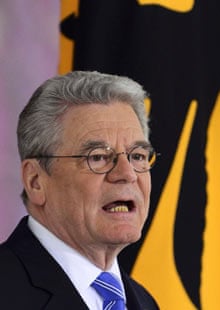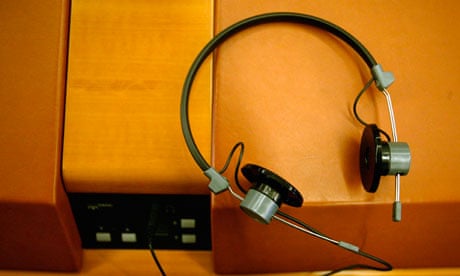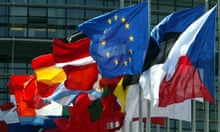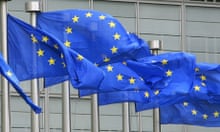Money talks, especially in Brussels. A billion euros are usually "mil milhoes de euros" in Portuguese, or a thousand million. In Spanish, likewise, "billón" means a million million, so billion is "mil millones de euros". Confusingly, "billion" translates as "milijarde" into Croatian, or "miljard" into Dutch. When the French talk of "un billion", they are referring to what Britons call a trillion. Oh, and a German "Billiarde" is a French "quadrillion". Of course.
Translation in the EU's headquarters is a complicated – and often costly – business. The European commission has three official "procedural languages": German, French and English. But with the union expanding and 23 languages now spoken in member states, the number of translators has ballooned from 200-300 to 2,000-3,000. It is estimated that the EU produces 1.76m pages of translation work a year, costing €300m (£257m). As of 1 July, when Croatia joins the EU, there will be one more language to add to the pile.
In these austere times, national governments are eager to trim the EU budget, which is one reason why a recent speech by the German president was welcomed with such enthusiasm. In a keynote speech on the future of European integration in February, Joachim Gauck suggested English should become the EU's official language: "It is true to say that young people are growing up with English as the lingua franca. However, I feel that we should not simply let things take their course when it comes to linguistic integration." It was music to the ears of federalists and fiscal hawks: with English spoken in the corridors of Brussels, the EU would become more streamlined and more efficient.
But how realistic is it? To an extent, it would just confirm a trend already taking place. Since the "big bang" of eastern European enlargement in 2004, the use of French has declined in conference meetings – and German is these days an "official language" on paper only. Documents in the European parliament are only translated into relevant languages: there are no transcripts on common fisheries policies in Czech, for example.

But if northern and eastern member states would welcome English as an official language, the south would be up in arms. Some French diplomats say English would smuggle "Anglo-Saxon" notions about politics and the economy into the heart of European policymaking. Last December, a journalist from the French daily Libération boycotted a press conference on the EU presidency in Dublin because it was solely in English. If there really was no money for translators, he argued on his blog, it should have been held in Gaelic instead.
There would be legal obstacles too. "Imposing English as the official language of Europe would be profoundly undemocratic," said Diego Marani, a novelist and policy officer for the Directorate-General for Interpretation at the European commission. Far from making Europe more integrated, it could make the project even more elitist. The total cost of EU language work, according to Marani, works out at roughly the cost of two coffees each person each year: a small price to pay for a bit more democracy.
How about alternative solutions? A proposal to make Latin the official working language is sadly an old April fool, but one interpreter thinks Esperanto would be a fairer lingua franca than English. Another suggests a rule whereby diplomats should never be allowed to speak in their mother tongue to create an even playing field. In Marani's office, employees have been experimenting with "Europanto", which he describes as "der jazz des linguas": a freestyle mash-up language made up of the common body of European languages, without grammar rules and an unlimited vocabulary.
Europanto is a joke, of course, but it may carry a serious message. Imposing a common European language may be a political impossibility, but that's not to say that such a language won't develop naturally in the long run anyway. Last year a frustrated senior translator at the European court of auditors compiled a 33-page document on commonly misused English phrases in EU publications ("to precise" meaning "to summarise" for example, or "actors" to mean "people or organisations involved in doing something" rather than "performer on a stage"). Eurospeak may not sound pretty to native English ears, but it may just be a lingua franca forming in front of our eyes. Discardant la textbuch, externalise sus sprachangst y just improviste.







